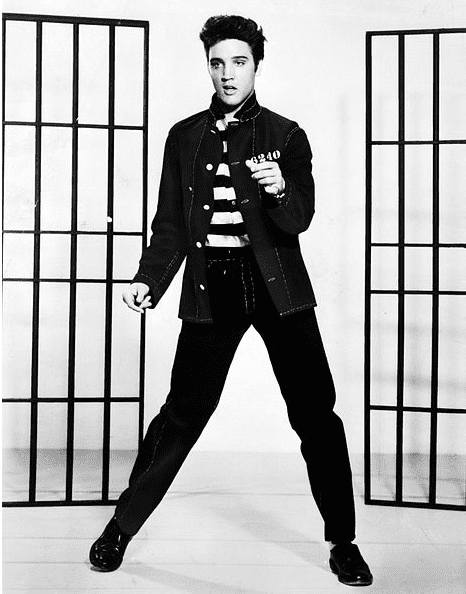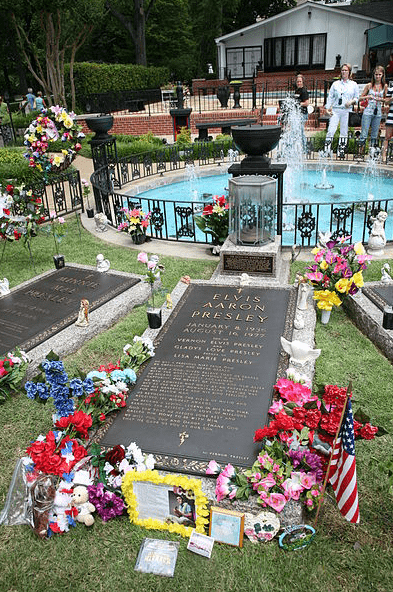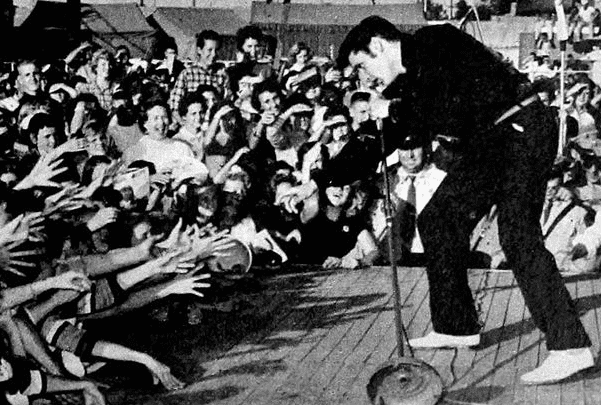The life of Elvis Presley, a singer so influential in the development of popular music that he was called the “King of Rock ’n’ Roll,” came to a sad and sudden end when he died on the morning of 16 August 1977, apparently of a heart attack, at the age of 42. Presley died alone in a bathroom in his 23-room mansion, 14-acre estate in Memphis, Tennessee, called Graceland, and is buried there along with his parents and grandmother. The exact cause of his death is unknown, and remains controversial to this day.

Presley, born in poverty and once a $35-a-week truck driver, rose to have a remarkable and unparalleled 22-year career, becoming popular music’s best-selling solo artist of all time. Once incredibly energetic and successful, Presley’s final years were marked by a steep decline. His last albums failed to dent the pop charts, he became severely overweight and drug-addled, and in his final concerts often slurred his words and was barely able to move.
Presley’s health problems continued to worsen, as he suffered from an enlarged colon, glaucoma, heart disease, high blood pressure, hypertension, and liver damage. A later investigation revealed that in the last eight months of his life, Presley’s personal physician, Dr. George C. Nichopoulos, prescribed to Elvis over 10,000 doses of amphetamines, narcotics and sedatives. (Although cleared of wrongdoing in Presley’s death, Dr. Nichopoulos’s license was suspended for three months, and in 1990 the Tennessee Medical Board revoked his license due to over-prescription.)

The following two articles are about the death of Elvis Presley. The first article is a news report about his death, and the second presents the reaction of several prominent entertainers and others who knew him.
Here is a transcription of this article:
Elvis Dies at 42 of Heart Failure
MEMPHIS, Tenn. (UPI) – Elvis Presley, the gyrating king of rock ’n’ roll who forever changed the face of music two decades ago when he growled “You Ain’t Nothin’ but a Hound Dog,” died at his mansion Tuesday of an “erratic heartbeat.”
The 42-year-old singer – “Elvis the Pelvis” when he burst upon the world in the mid-1950s – died face down on the floor of a bathroom at his Graceland mansion.
He was found there by his road manager, Joe Esposito, at 2:30 p.m. (3:30 p.m. EDT). But Shelby County Medical Examiner Dr. Jerry Francisco said Presley may have been dead since 9 a.m.
Francisco told newsmen after an autopsy that Presley died of “cardiac arrhythmia,” which he described as a severely irregular heartbeat. He said it was brought about by “undetermined causes.”
Both Francisco and Dr. George Nichopoulos, Presley’s personal physician, said there was “no evidence of any illegal drug use.”
Efforts to revive Presley were abandoned at Baptist Hospital at 3:30 p.m. (4:30 p.m. EDT).
Rumors of his death raced from coast to coast. When it was confirmed, the mourning began.
Radio stations throughout the world played the king’s music. Politicians and entertainers eulogized him. Record shops, which in his 22 years of recording sold 400 million Elvis Presley albums, were jammed.
Presley brought rock ’n’ roll to the world with “Hound Dog,” “Heartbreak Hotel,” and “Blue Suede Shoes.” Teenagers went into a frenzy and adults, seeing his long shiny hair, sideburns, hooded eyes, and most of all his grinding hips, went into shock.
He was, as Gov. Cliff Finch of his home state of Mississippi said, the “personification of the American dream.” He rose from poverty to incredible wealth.
But one of his best friends, singer Pat Boone, said he lived as a “haunted man… and exile” afraid to fly, afraid of the massive and frantic demonstrations that greeted his every public appearance right up until the last. He lived in seclusion, appearing only on his concert tours.
Francisco said at a news conference that “There was severe cardiovascular disease present. He had a history of mild hypertension and some coronary artery disease. These two diseases may be responsible for the cardiac arrhythmia. But the precise cause was not determined. Basically it was a natural death.”
“The precise cause of death may never be discovered,” he said.
“There certainly were some drugs being given for the medical condition that was present. There was no evidence of cocaine use.”
Nichopoulos said Presley was “using medicine for his blood pressure, several different kinds, and for the colon problem that he had.”
“I arrived at the mansion about 2:35 p.m.,” said Nichopoulos, “the time [the] ambulance was leaving his house. I am sure he was dead at that time.”
“He was lying on his face on the floor. The people in the house with him were asleep and were not aware that anything abnormal had transpired.”
He said Presley went to a dentist Monday night “to have work done on several teeth. He came back home and played racquet ball from 4 until 5:30 a.m. and went to bed about 6 a.m.”
Presley so shocked the nation’s parents with his gyrations when he first appeared on television that the second time he appeared on the Ed Sullivan Show the camera never showed him below the belt.
Presley had been fighting a weight problem and various ailments – primarily described as fatigue from his intense tour schedules – for several years. He was in Baptist Hospital as late as April, suffering from intestinal flu and fatigue.
His minions – and his generosity with them – were legend. On at least several occasions he gave brand new Cadillacs to individuals whose courtesy struck his fancy, or to whom he feared he may have been unkind.
Presley had a daughter, Lisa, by Priscilla Beaulieu, an Air Force officer’s daughter he met while in the Army in Germany. She was 14 then and he was 25.
With her parents’ permission, she returned to Memphis with him when he was discharged and they lived together for seven years before they were married in 1967. They were divorced in 1973.
Priscilla received alimony of $6,000 a month, child support of $4,200 a month, 5 per cent of the stock in Presley’s music company and half the proceeds of the sale of their home in Beverly Hills, Calif.
The teenagers’ idol of the ’50s, whose appeal carried on almost unabated even through a brief semiretirement, was born in Tupelo, Miss., on Jan. 8, 1935, one of a pair of twins, to Gladys and Vernon Presley.
His mother said: “We matched their names – Jesse Garon and Elvis Aron. Jesse died when he was born. Maybe that is why Elvis is so dear to us.”
The family moved to Memphis when Elvis was 13. He attended L.C. Humes High School, and worked as an usher in a local movie theater. After graduation, he took a job at $35-a-week driving a truck.
Here is a transcription of this article:
‘Incredible Tragedy’
Elvis Left His Mark on Many
From Wire Reports
From the beautiful people to everyday housewives, Elvis Presley was remembered on his death Tuesday as the “King of Rock ’n’ Roll” who marked the lives of many.
“It’s an incredible tragedy,” said singer Cher Allman in Los Angeles. “The first concert I ever attended was an Elvis Presley concert when I was 11 years old. Even at that age, he made me realize the tremendous effect a performer could have on an audience.”
Carl Wilson of the Beach Boys singing group said Elvis influenced their music and was unique to Wilson’s generation.
“His music was the only thing exclusively ours,” he said. “His wasn’t my mom and dad’s music… his voice was a total miracle, a true miracle in the music business… it had an influence on the entire group.”
Entertainer Ann-Margret, who appeared in a number of movies with Presley, the most famous of which was “Viva Las Vegas,” said: “I’ve lost a very dear friend, and the world has lost a very great entertainer. Not only was Elvis a legend in his own time, but his unique talents will be even more appreciated in years to come.”
Country music singer Hank Snow, who said he helped arrange Presley’s first recording contract, called Presley “a genuine superstar.”
“I think if anybody deserved to be called a legend and a superstar, it would be Elvis,” said Snow. “He was very versatile; he covered the pop field, the middle of the road field, the blues and, of course, earned the title ‘King of Rock ’n’ Roll.’”
“I don’t believe there will ever be another who can surpass his success at what he did across the world,” said Snow. “I would like to always remember Elvis as I knew him then – a perfect gentleman and a great example to American youth.”
“Elvis Presley was more than just a great talent,” said Barron Hilton, president of the Hilton Hotel chain in Las Vegas, where Presley performed in an early sell-out two-week engagement last December. “He was most certainly the world’s top entertainer and he will be greatly missed by all of us.”
Mrs. Ernestine Williams, Presley’s longtime maid who retired five years ago because of ill health, remembered cooking fried chicken for him.
“Elvis was fine, very nice, he carried on a lot of foolishness when he was in a good mood,” she said.
Presley’s uncle, who works as a guard at Graceland Mansion, where Presley lived, said Elvis had been out Tuesday morning and “everyone said he looked real good.”
“He had the best heart of anybody in the world as far as goodness and stuff to people, he never harmed nobody, Elvis was a fine boy. I remember him for the goodness and what he’s done for the people and us his family.”
Pat Boone, who rose to stardom with Presley in the 1950s, said the rock star died “young like James Dean and perhaps that’s the best way for the public to remember him.”
“No one can imagine an old Elvis,” he said in Pittsburgh.
Note: An online collection of newspapers, such as GenealogyBank’s Historical Newspaper Archives, is not only a great way to learn about the lives of your ancestors – the old newspaper articles also help you understand American history and the times your ancestors lived in, and the news they talked about and read in their local papers. What are your memories of Elvis Presley? Please share your stories with us in the comments section.
